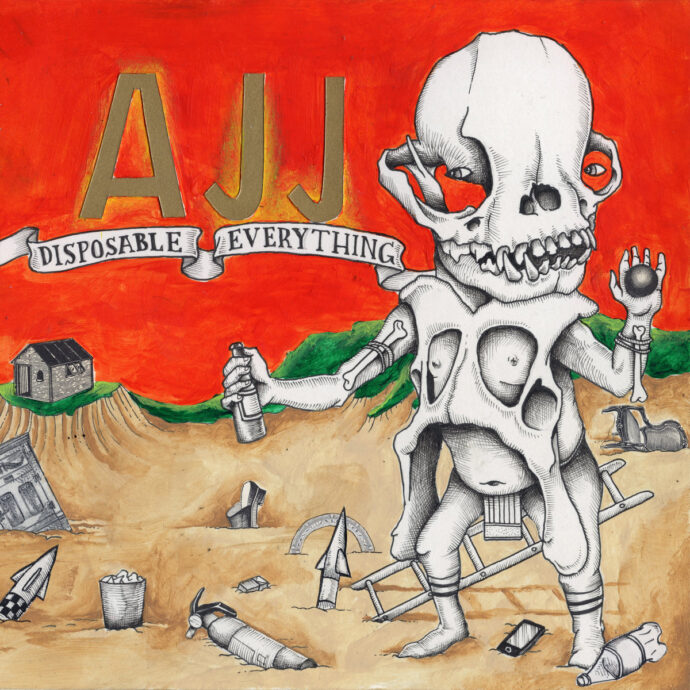It’s interesting to see how many years it takes a band or artist to make eight full-length studio albums after releasing their first. Many artists don’t stay at it long enough to hit the magic number. Lots of groups have amazing careers with far fewer records than eight. It took the Beatles four years to make eight studio albums. It took Led Zeppelin ten. For AJJ (the band formerly known as Andrew Jackson Jihad) it took nineteen. If that sounds like a long time, consider this: it also took Michael Jackson nineteen, and it took the Beastie Boys twenty-five and De La Soul twenty-seven. Are bands’ eighth studio albums traditionally any good? It varies. Black Sabbath’s Never Say Die! and Zeppelin’s In Through the Out Door are not considered those bands’ best works. On the other hand, many deem the Beatles’ Sgt. Pepper’s Lonely Hearts Club Band and AC/DC’s Back in Black the high-water mark in terms of recorded output for those acts. So where does AJJ’s eighth studio album, Disposable Everything, fall?
Folk punk band AJJ’s latest album is a collection of fourteen, mostly upbeat, songs that fuse punk energy with thoughtful lyrics. All but the first and last tracks are under three minutes long and are performed with a combination of electric and acoustic instruments. Some moments are more cryptic than others, like the record’s opener, “Strawberry (Probably)”, which seems to gleefully analogize romantic longing with smashing capitalism. The peppy “Dissonance” feels like mid-aughts Decemberists (not a bad thing) while “Death Machine” which, with its cheery chord progression contrasted with sardonic lyrics about living in a death machine, seems to take its cues from They Might Be Giants’ wryest songs. The ballad “White Ghosts” utilizes the addition of lovely piano and strings, and although the track is among the gentlest and most beautiful, AJJ still manage to infuse humor with lines like, “My hate burned away, my cock knocked all in the dirt.”
The album’s percussion-free title track arrives just before the end of the first side and features emotive violin by Vicki Brown and piano by the great multi-instrumentalist Thor Harris. “The Baby Panda” closes out Disposable Everything’s A side. The song is notable because its repeated chorus of “it’s not coming baaaaack” helps make it the record’s most memorable and catchiest moment, though, at under two minutes, it also carries the distinction of being one of the shortest songs here. “Candles of Love” includes a piano refrain reminiscent, at least initially, of Bill Withers’ “Lean on Me”. In the song’s last minute, Jeff Rosenstock (credited as Jeff Rosensax) provides a brief saxophone solo that feels just long enough.
Disposable Everything’s final third gives the impression AJJ is running out of ideas. The one-minute long “I Hate Rock and Roll Again” uses the same joke Propaghandi’s “Ska Sucks” did by being performed in the genre its shitting on. “I Wanna Be Your Dog 2” is an immediately obvious tongue in cheek take on the Stooges’ first single, and, as if AJJ sense their creativity waning, the record’s penultimate moment, “All of My Woulds”, includes the lines, “Everything I could’ve done better, the reverb could’ve been a bit wetter.” The album’s final song, “In the Valley”, manages to pull things back together in the final minutes by delivering a charming song that sounds like something that could have come from any one of Will Oldham’s projects. All told, there’s more good than bad here, and, fortunately, the record’s most hackneyed moments are kept relatively brief. As far as eighth studio albums go, Disposable Everything manages to land on the favorable side of AJJ’s discography.
Rating: 7.2/10

